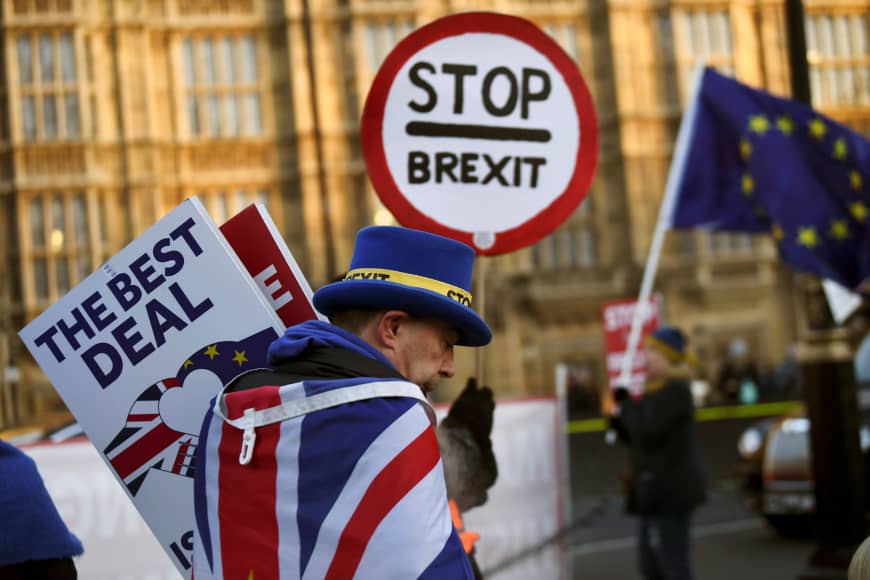Brexit in a stalemate
January 21, 2019 | Expert Insights

Talks to end the U.K.’s Brexit stalemate appeared deadlocked, with neither Prime Minister Theresa May nor the main opposition leader shifting from their entrenched positions.
Background
On June 23rd, 2016, Britain narrowly voted to leave the European Union, stunning Europe and the world in general. The EU employs a set of policies for its 28-member states that aim to ensure the free movement of people, goods and trade among other services. Britain is deeply intertwined with the workings of the EU especially with regard to trade.
PM Theresa May’s leadership in the negotiations has been heavily criticised. She has been unable to form a consensus within the Parliament, or even her own party, for the course of Brexit. Her “directionless” leadership has not convinced most of her peers in Westminster and she was challenged by a no-confidence motion in early December 2018, which she narrowly won.
Despite her best efforts, the British parliament is not accepting the proposed Brexit agreement. Irrespective of whether they arrive on a deal or not, the UK is officially set to leave in March 2019. PM May has just survived a turbulent week in Parliament as she saw her proposed Brexit plan defeated with the largest margin in a century but also surviving a potentially course-changing no-confidence motion raised by Jeremy Corbyn.
Analysis
PM May has been meeting with politicians from several parties in a bid to find a way forward after her European Union divorce deal was rejected by Parliament this week. However, she is unwilling to move her “red lines,” which include taking the U.K. out of the bloc’s customs union. And Labour Party leader Jeremy Corbyn refuses to meet with May unless she rules out the possibility of Britain leaving the EU with no deal.
May, who narrowly defeated a no-confidence vote triggered by Corbyn this week, said on Thursday that it was “not within the government’s power to rule out no-deal” because by law the U.K. will leave the EU on March 29 “unless Parliament either agrees with a deal with the EU or the U.K. … chooses to stay in the EU permanently.”
The political chaos has spurred EU nations to step up preparations for a disorderly Brexit. France and other countries are spending millions, hiring thousands of workers and issuing emergency decrees to cope with the possibility that the U.K. will crash out of the bloc, sparking major disruptions to travel and trade.
A group of high-profile Germans made an emotional appeal to the U.K. to stay in the bloc. A letter published in the Times of London said that “without your great nation, this Continent would not be what it is today: a community defined by freedom and prosperity.” It went on to list things Germans would miss about the U.K., among them “tea with milk” and “going to the pub after work.” The signatories include Annegret Kramp-Karrenbauer, leader of Chancellor Angela Merkel’s Christian Democratic Union, Airbus chief Tom Enders and former German national soccer player Jens Lehmann.
Amid the political impasse, May’s domestic opponents are gathering. Ex-Foreign Secretary Boris Johnson used a speech Friday to accuse May of lacking the “gumption” to get a favorable Brexit deal from the EU. Johnson, who harbours ambitions of becoming party leader and prime minister, said May should use the crushing defeat of her withdrawal deal in Parliament as a cudgel to force the EU to give the U.K. a better deal. He dodged a question of whether he would support May as party leader if a sudden general election is called, saying one wouldn’t be necessary.
“Go back to Brussels and get a better deal,” he urged May, even though EU leaders have said the withdrawal agreement won’t be renegotiated. May will publish her revived Brexit blueprint on January 21, before lawmakers debate it on January 29.
In neighbouring France, the prime minister inspected his country’s preparedness for a no-deal Brexit, visiting the Eurotunnel complex and meeting with small businesses on the English Channel coast.
Assessment
Our assessment is that the possibility of Brexit not happening altogether is getting stronger with every failure of the Theresa May government. We believe that the Conservative Government may request an extension from the EU on the exit date especially after German Foreign minister has signalled an intent to cooperate with London.








Comments